Wisconsin Courts Struggle To Meet Language Translation Needs
Search for qualified interpreters is delaying justice in some cases.
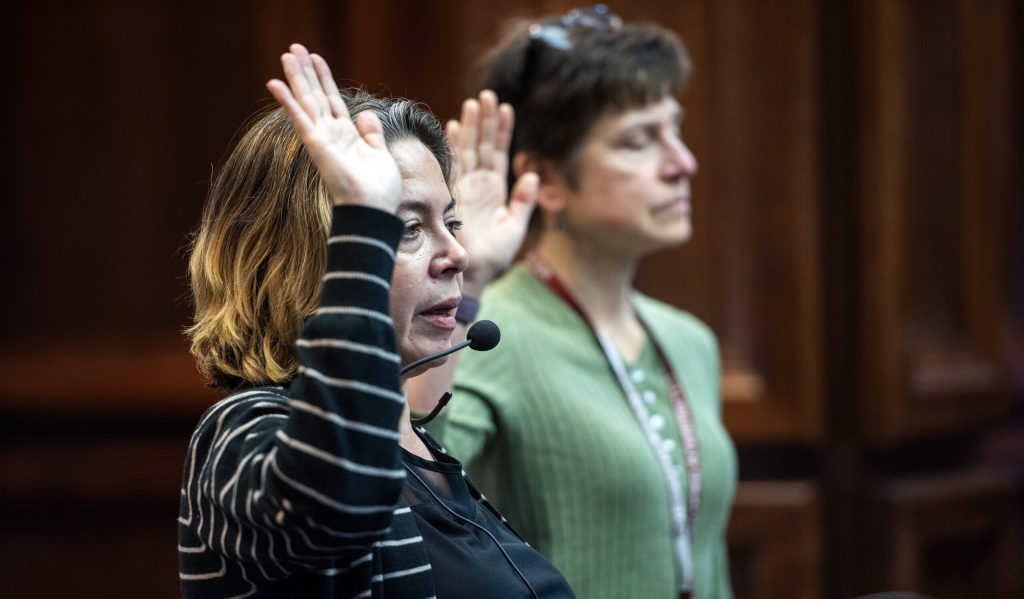
Court interpreters Reme Bashi, left, and Floralba Vivas, right, take an oath, promising to uphold the interpreter code of ethics, before a sentencing hearing in Milwaukee County Circuit Court on Friday, March 21, 2025, in Milwaukee, Wis. Angela Major/WPR
When Reme Bashi first started her job as a court interpreter in Milwaukee County Circuit Court, she wore high heels to the courthouse.
“Then I went to flats,” she said. “Now I’m in the sneaker phase.”
On a recent Friday, Bashi put those sneakers to work as she walked from hearing to hearing in the sprawling complex that houses Wisconsin’s largest circuit court.
“I turn down almost as many jobs as I accept,” said Bashi, who’s spent nearly two decades as certified interpreter in Wisconsin.
Under Wisconsin law, people with limited English proficiency have the right to a qualified interpreter in circuit and appellate courts.
That applies to witnesses, people accused of crimes, victims and their family members.
The right to an interpreter is also covered under federal law. The Americans with Disabilities Act, for instance, guarantees access to an interpreter for people who are deaf or hard of hearing.
But in Wisconsin, finding the right interpreter is often challenging due to a limited supply of those professionals. Some interpreters say changes, including increased pay, are needed to address the gap.
“We cannot guarantee a qualified interpreter for every hearing as the hearing is scheduled,” said Milwaukee County Judge Carolina Maria Stark. “The need outweighs the supply that we have.”
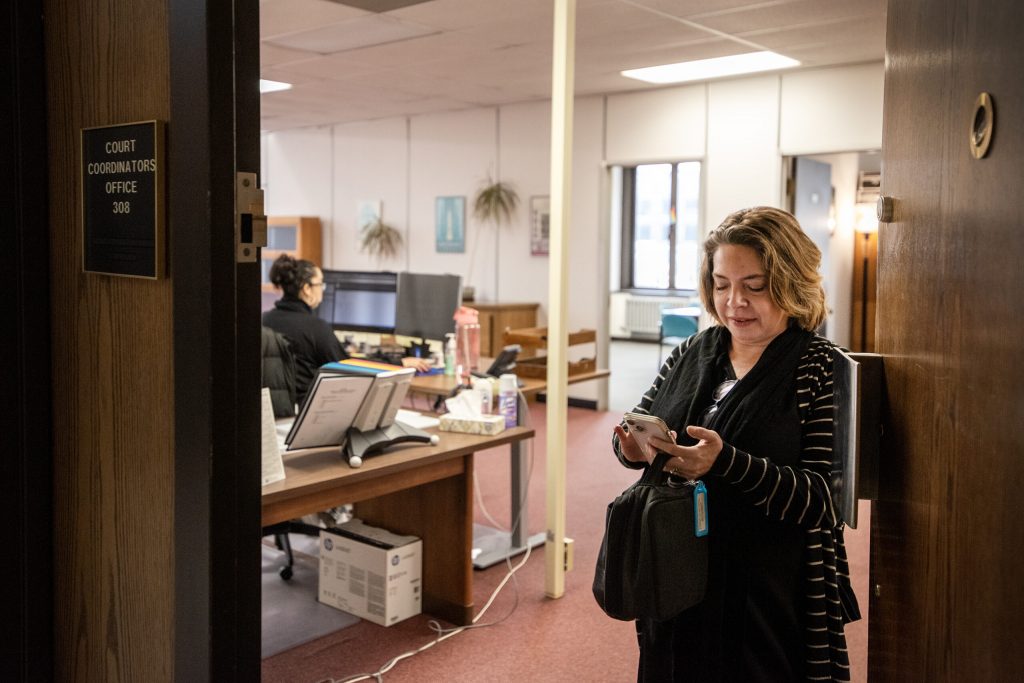
Court interpreter Reme Bashi looks at a schedule on her phone to see where interpretation services are needed Friday, March 21, 2025, at the Milwaukee County Courthouse in Milwaukee, Wis. Angela Major/WPR

Court interpreters Reme Bashi, left, and Floralba Vivas, right, walk through a hallway on their way to court proceedings Friday, March 21, 2025, at the Milwaukee County Courthouse in Milwaukee, Wis. Angela Major/WPR
‘Justice delayed is justice denied’: Shortage leads to postponed proceedings
At times, Stark has had to postpone hearings while court officials search for the right interpreter.
Stark chairs a statewide committee dedicated to improving language access in Wisconsin courts, but she specified that she was speaking only for herself and not the Milwaukee County or the state court systems.
“There is a common phrase — justice delayed is justice denied,” Stark said. “Every time something gets delayed because we do not have access to a qualified interpreter for that hearing, there’s a whole slew of negative consequences that come along to that that are real to individuals, to families and to our communities.”
Kimberley Bayer, a private practice attorney in Milwaukee, recalls how one of her clients had to wait months for an answer in his parental rights case.
“It really was pretty painful, having to tell him over and over, ‘We don’t have enough interpreters, so we’re going to have to get a new date,’” Bayer said. “Because there’s all this buildup to your court date, and then when it just gets canceled, it’s really kind of upsetting.”
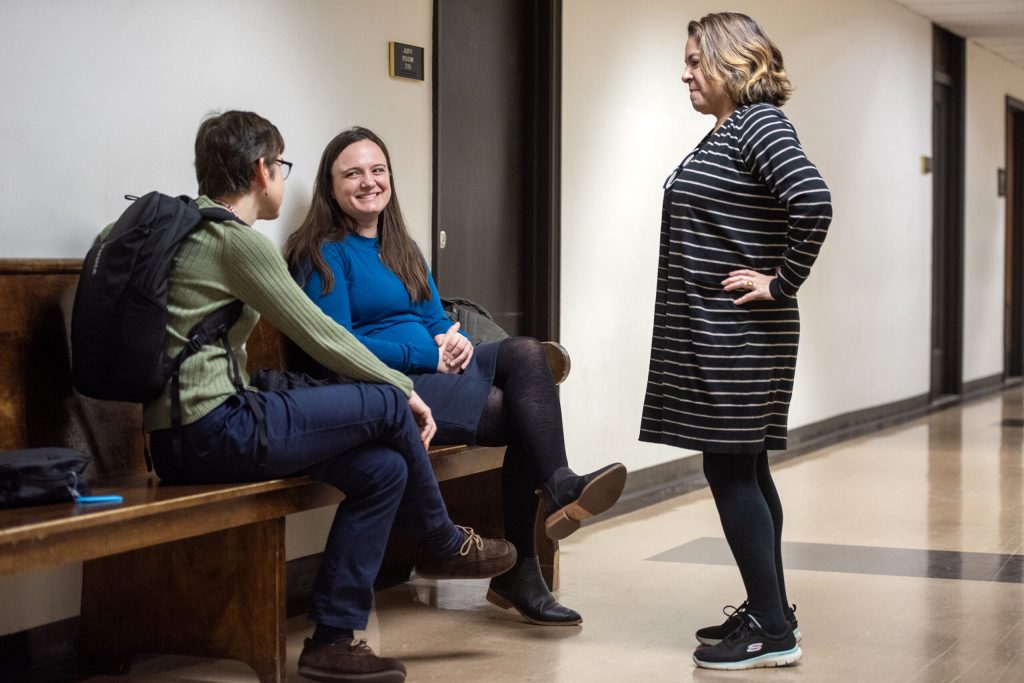
Court interpreters Reme Bashi, right, and Floralba Vivas, left, speak to attorney Kimberley Bayer, center, as they walk between courtrooms Friday, March 21, 2025, at the Milwaukee County Courthouse in Milwaukee, Wis. Angela Major/WPR
In some cases, a decision could be overturned if a court fails to appoint an interpreter, especially if an attorney can prove that someone never got proper notice of their rights or of the charges against them, Bayer noted.
But ultimately, Bayer believes that interpreter access comes down to fundamental fairness.
“In our country, the idea is that everybody in court is supposed to be equal,” Bayer said. “Just because you don’t speak English as a native speaker doesn’t mean you don’t get to be in exactly the same situation as someone who does.”
Some call for higher pay to help meet demand
Demand for interpreter services appears to have grown in Wisconsin in recent years.
In 2023, courts across Wisconsin billed for more than 26,200 hours of interpretation — a 27 percent increase compared to five years prior. That’s according to data from the state court system, which partially reimburses counties for interpreter costs.
Janis Palma, a board member of the National Association of Judiciary Interpreters and Translators, said Wisconsin is one of “many states” struggling with an unmet need for court interpreters. She said higher pay would help alleviate the problem.
“There is a demand for certain skills and certain knowledge, but that’s not being compensated at the level that is being demanded,” Palma said.
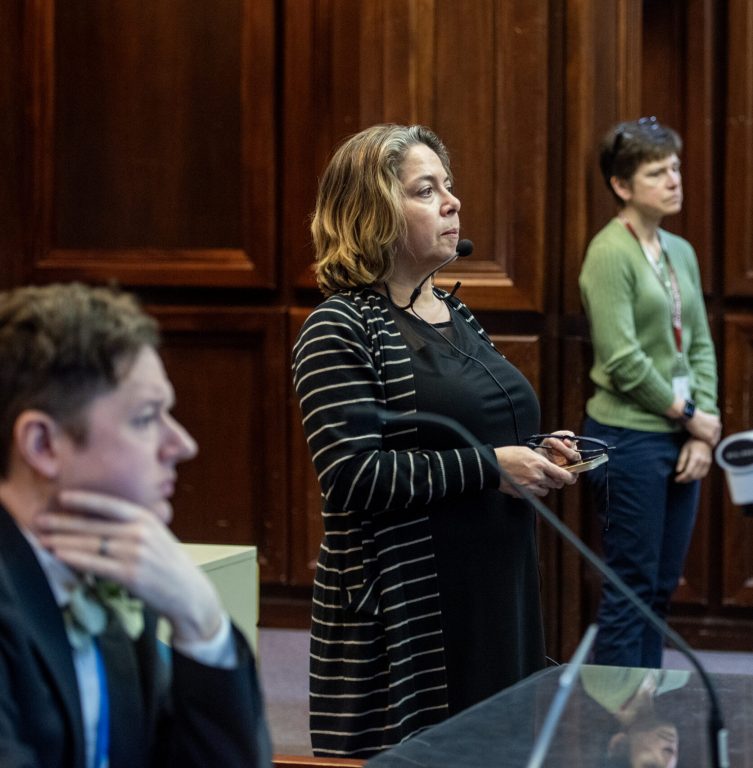
Reme Bashi, left, and Floralba Vivas, right, interpret from Spanish to English and English to Spanish during a sentencing hearing on Friday, March 21, 2025, in Milwaukee, Wis. Angela Major/WPR
Most court interpreters in Wisconsin are independent contractors, and their wages vary depending on how commonly spoken their language is. Across Wisconsin, Spanish interpreters earn an average of $70 an hour, while Hmong and Arabic interpreters earn nearly $90, according to 2023 data submitted by the state court director in a letter to the Wisconsin Supreme Court.
In Milwaukee County, officials recently increased pay for court interpreters from $50 to $65 an hour. The county also reimburses interpreters for drive time and mileage, according to the court system budget. Last year, the county spent $905,888 on court interpreter fees.
She notes that being a court interpreter takes more than just being bilingual.
Assuming that speaking two languages is enough to qualify as an interpreter is like saying “because you breathe, you are a pulmonary expert,” said Green, who interprets in Spanish, French and Italian.
Interpreters need to understand legal jargon and the legal process. And they have to process what’s being said and switch it from one language to another almost simultaneously.
“All of this is happening at the same time your brain is working overtime,” said Palma, who works as a court interpreter in Texas. “And this is very difficult for some people to realize — this is a very high skill.”
Only a few Wisconsin interpreters pass certification exams each year
Although certification exams aren’t available in every language, Wisconsin judges are supposed to use certified interpreters whenever possible. Those interpreters have passed a multi-step examination process from the National Center for State Courts.
But the exams are difficult. Last year, only four people became fully certified in Wisconsin.
If certified interpreters aren’t available, a Wisconsin judge’s next choice is supposed to be a “provisional” interpreter who scored at least 65 percent on the oral certification exam but didn’t fully pass.
Since there are no certified Hmong interpreters currently living in Wisconsin, the courts here often rely on Hmong interpreters who drive in from Minnesota.
And, although some court interpretation can take place over video conference, finding an in-person interpreter can be particularly challenging in rural areas, State Courts Director Audrey Skwierawski wrote in an email to WPR.
Some Wisconsin courts, including Milwaukee County’s, have a dedicated staff person focused on interpreter scheduling. Wisconsin also has an interpreter program manager who oversees the court interpreter orientation and certification program statewide.
Additionally, Democratic Gov. Tony Evers’ latest budget request asks for a new part-time support person for the state’s court director program. Wisconsin’s court system estimates it would take $80,300 over two fiscal years to fund that position.
“We appreciate that the Governor’s budget proposal included our request to add a position to help address certification issues and put even more focus on recruitment,” Skwierawski wrote. “We are hopeful that the Legislature agrees that this is an important item to include in the final budget.”
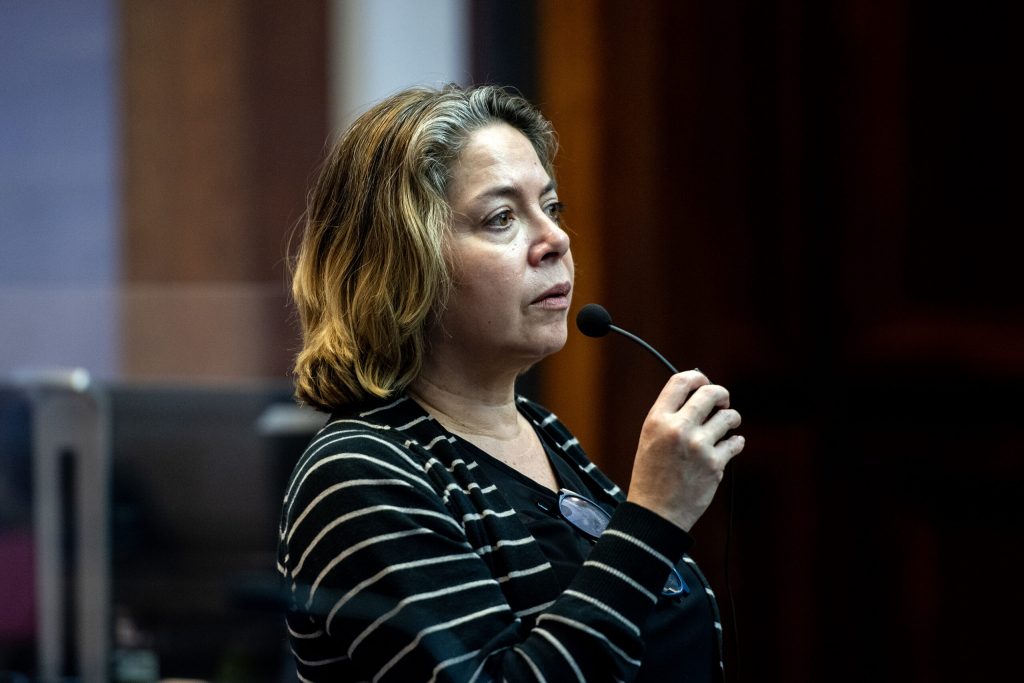
Court interpreter Reme Bashi speaks into a microphone as she translates court proceedings from English into Spanish on Friday, March 21, 2025, in Milwaukee, Wis. Angela Major/WPR
A more established educational pipeline could be another part of the solution to Wisconsin’s interpreter shortage, interpreters and other court professionals said.
“It is a very challenging situation to assist even those who are really interested in becoming court interpreters to develop that very unique and very specialized skill set,” said Stark, the Milwaukee County judge.
In recent years, Stark believes the court system has been making some strides in onboarding new interpreters. In Wisconsin, people who want to become interpreters start by paying a $175 fee for an online training that covers the fundamentals of the profession.
Saul Arteaga is among the people involved with that process. Arteaga owns a company called Southern Wisconsin Interpreting & Translation Services, and he also volunteers as a mentor to prospective interpreters, offering them guidance through the certification process.
Before he became a certified Spanish interpreter, he found that process intimidating.
“I remember I was seeing how people interpret simultaneously, and I thought, ‘Wow … that’s almost impossible,’” Arteaga said. “But then, after I learned techniques in what it entails, it helped me to focus on achieving that. So that guidance is very important.”
Back in a Milwaukee County courtroom, Bashi joins Floralba Vivas, a newly certified Spanish interpreter. Each woman swears an oath, promising to interpret accurately to the best of her abilities.
Interpreting can be mentally exhausting, and research shows that its accuracy goes down over extended time periods. For that reason, under Wisconsin’s best practices, interpreters are told to switch off during long assignments.

Court interpreters use these receivers and transmitters so people can hear their interpretation in court Friday, March 21, 2025, at the Milwaukee County Courthouse in Milwaukee, Wis. Angela Major/WPR
As they take turns interpreting, Bashi and Vivas each speak into a small microphone and listen through headphones.
Under Wisconsin’s code of ethics, an interpreter must serve as a neutral party who doesn’t advocate for the interests of any one person in the courtroom.
Bashi likes using a headset to interpret because it allows her to emphasize her neutrality by standing apart from everyone else.
“It’s not our job to give opinions or help anybody or explain anything and, when you have equipment, it’s a lot easier for people to understand that you are a professional for communication and not somebody that’s going to help with something else,” Bashi explained. “It helps keep a little bit of distance.”
Bashi switches from English to Spanish and back again as Judge Danielle Shelton sentences a man in a reckless driving case.
After the judge hands down some jail time, Bashi takes off her headset.
Then she’s back on her feet in the courtroom hallway, waiting to be called wherever interpretation is needed next.
Interpreters wanted: Wisconsin courts struggle to meet language needs was originally published by Wisconsin Public Radio.
If you think stories like this are important, become a member of Urban Milwaukee and help support real, independent journalism. Plus you get some cool added benefits.





















